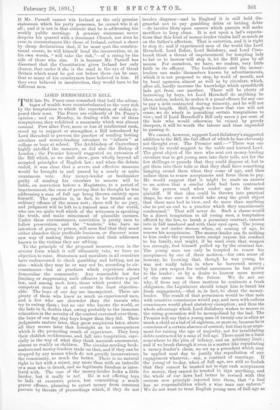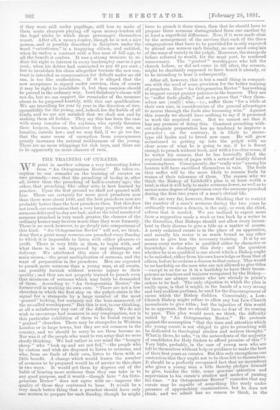LORD HERSCHELL'S BILL. T HE late Dr. Pusey once remarked that
half the advan- tages of wealth were counterbalanced to the very rich by the temptations to which the expectation of riches ex- posed their sons. The Peers are evidently of Dr. Pusey's opinion ; and on Monday, in dealing with one of these temptations, they exhibited a unanimity which was almost comical, Peer after Peer, more or less of intellectual rank, stood up to support or strengthen a Bill introduced by Lord Herschell to prevent the practice of sending betting circulars and. money-lending circulars to " infants " at college or boys at school. The Archbishop of Canterbury highly extolled the measure, as did also the Bishop of London ; the Premier himself suggested an extension of the Bill which, as we shall show, goes wholly beyond all accepted principles of English law ; and when the debate ended, it was clear that a severe and effective measure would be brought in and passed by a nearly or quite unanimous vote. Any money-lender or bookmaker guilty of sending his circulars to minors will be liable, on conviction before a Magistrate, to a period of imprisonment, the onus of proving that he thought he was addressing a man of full age being thrown entirely upon himself. The practice is, in fact, to be treated as an ordinary offence of the minor sort ; there will be no jury, an judgment will be left to a trained man of the world, who can see quite well which of the witnesses is speaking the truth, and make mincemeat of plausible excuses. Under these circumstances, conviction is pretty sure to follow prosecution, and the "touters," who have no intention of going to prison, will soon find that they must either abandon their profitable business, or discover some new way of making their promises and their addresses known to the victims they are seeking.
To the principle of the proposed measure, even in the severer form which it will ultimately take, we have no objection to raise. Statesmen and moralists in all countries have endeavoured to check gambling and betting, not as sins—which they may be or may not be, according to cir- cumstances—but as practices which experience shows demoralise the community. Any reasonable law for limiting or suppressing such offences is therefore a good law, and among such laws, those which protect the in- competent must be at all events the least objection- able. The boys of our day are incompetent. There are plenty of them who know as much as experienced men, and a few who are shrewder than the rascals who try to entrap them ; but no one who knows the world, or the lads in it, doubts that, owing probably to the immense relaxation in the severity of the control exercised over them, the boys of our day stay boys longer than they did. Their Judgments mature later, they grow suspicious later, above all they secure later that foresight as to consequences which is the protecting result of experience. They keep their childish recklessness, and fall into temptation, espe- cially in the way of what they think mannish amusement, almost as readily as children. The circular-sending book- makers and money-lenders trade on that, and if they can be stopped by any means which do not greatly inconvenience the community, so much the better. There is no natural right to bet with a minor, any more than with an imbecile or a man who is drunk, and no legitimate freedom is inter- fered with. The case of the money-lender looks a little harder, but it really is not. He is not offering toys to lads at excessive prices, but committing a much graver offence, planning to extort money from innocent parents by threats of proceedings which, if they do not involve disgrace—and in England it is still held dis- graceful not to pay gambling debts or betting debts —do involve blots upon careers which parents will make sacrifices to keep clean. It is not upon a lad's expecta- tions that this kind of money-lender trades half as much as on the father's affection. That is extortion, and it is right to stop it ; and if experienced men of the world like Lord Herschell, Lord_ Esher, Lord Salisbury, and Lord Oran- brook think a threat of imprisonment for tempting lads to bet or to borrow will stop it, let the Bill pass by all means. For ourselves, we have, we confess, very little faith in its efficacy. The bookmakers and the money- lenders can make themselves known by advertisements, which it is not proposed to stop, by word of mouth, and by local agencies, almost as well as by circulars, which, after all, hardly increase the knowledge which spendthrift lads get from one another. There will be plenty of borrowing by boys, let Lord Herschel] do anything he likes, unless, indeed, he makes it a penal offence for any one to pay a debt contracted during minority, and he will not go that length. Still, though we know that vice will not cease, we do wisely in punishing certain temptations to vice ; and if Lord Herschell's Bill only saves 5 per cent. of the lads who would otherwise be ruined by greedy sharpers, it will be worth the labour and time expended in passing it.
We cannot, however, support Lord Salisbury's suggested addition to the Bill, the full effect of which he has obviously not thought over. The Premier said :—" There was one remedy he would suggest to the noble and learned Lord. The great object of the men who sent out money-lending circulars was to get young men into their toils, not for the few shillings or pounds that they could dispose of, but to get them into their toils so that they shall have something hanging round them when they come of age, and then induce them to renew acceptances and force them to pay. He would suggest that it might be made an answer to an action that a similar debt had been contracted by the person sued when under age to the same plaintiff. If that idea could be thrown into practical shape, he was sure it would take away the groat object that these men bad in view, and do more than anything else to put an end to a practice which they unanimously condemned." That will never do. Such a clause would be a direct temptation to all young men, a temptation offered by the law, to break a pecuniary contract, entered into in full manhood and with their eyes open. The young man is not under dureme when, on coming of age, he renews his acceptances. The money-lender can do nothing to him under the present laws, except expose his conduct to his family, and might, if he used even that weapon too strongly, find himself pulled up by the criminal law. The young man can only be tempted to renew his acceptances by one of three motives,—his own sense of honesty, he knowing that, though he was young, he was not really taken in when he borrowed money ; by his own respect for verbal assurances he has given to the louder; or by a desire to borrow more money of the same man in the future. We do not see why, if from any of these motives he contracts a fresh obligation, the Legislature should tempt him to break his fresh engagement,—that is, in fact, to cheat the money- lender. The result of that permission would be that men with sensitive consciences would pay, and men with callous consciences would plead statutory exemption ; and thus the whole advantage which Lord Salisbury wishes to secure to the rising generation will be monopolised by the bad. The Premier will say that a young man of twenty-one is often as much a child as a lad of of eighteen, or more so, because he is conscious of a certain absence of control; but that is an argu- ment for raising the age of majority, not for invalidating debts contracted by a man of full age. There must be alimit somewhere to the plea of infancy, and an arbitrary limit ; and if we break through it even in a, matter like repudiating a money-lender's claim, we set up a precedent :which may be applied next day to justify the repudiation of any engagement whatever,—say, a contract of marriage. If the young of to-day, when of full age, are still so foolish that they cannot be trusted not to sign rash acceptances for money, they cannot be trusted to sign anything, and the whole of our laws had better be revised with this curious new principle injected into them, that "a fool has no responsibilities which a wise man can enforce." We do not want to treat English young men of full age as if they were still under pupillage, still less to make of them acute sharpers playing off upon money-lenders all the legal tricks to which those personages themselves resort. After all, a money-lender, though he is not a nice person, and is possibly described in Scripture under the word "extortioner," is a taxpaying citizen, and entitled, when he makes a contract with a free man of full age, to all the benefit it confers. It was a, strong measure to re- duce his right to interest in every bankruptcy case to 5 per cent., when his debtor had contracted to pay 40 per cent. ; but to invalidate his claim altogether because the new con- tract is intended as compensation for default under an old one, is too like confiscation. If it is alleged that the new acceptance is signed under coercion, then of course it may be right to invalidate it,. but then coercion should he proved in the ordinary way. Lord Salisbury's clause will not do, but we can support the remainder of the measure about to be proposed heartily, with this one qualification. We are travelling far year by year in the direction of irre- sponsibility for the young, and, indeed, for the feeble of all kinds, and. we are not satisfied that we shall not end by making them all feebler. They say this has been the case with many inmates of the asylums, who openly threaten their keepers, because, whatever they do, they are, as lunatics, outside law ; and we may find, if we go too far, that the same sense of exemption from consequences greatly increases the natural recklessness of the young. There are no more whippings for rich boys, and there are to be apparently no more chances of ruin.







































 Previous page
Previous page